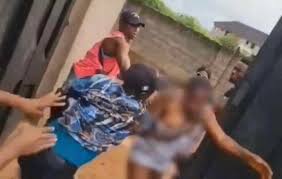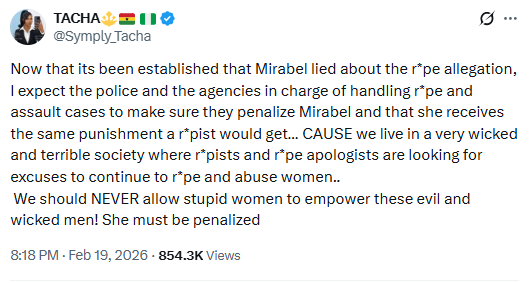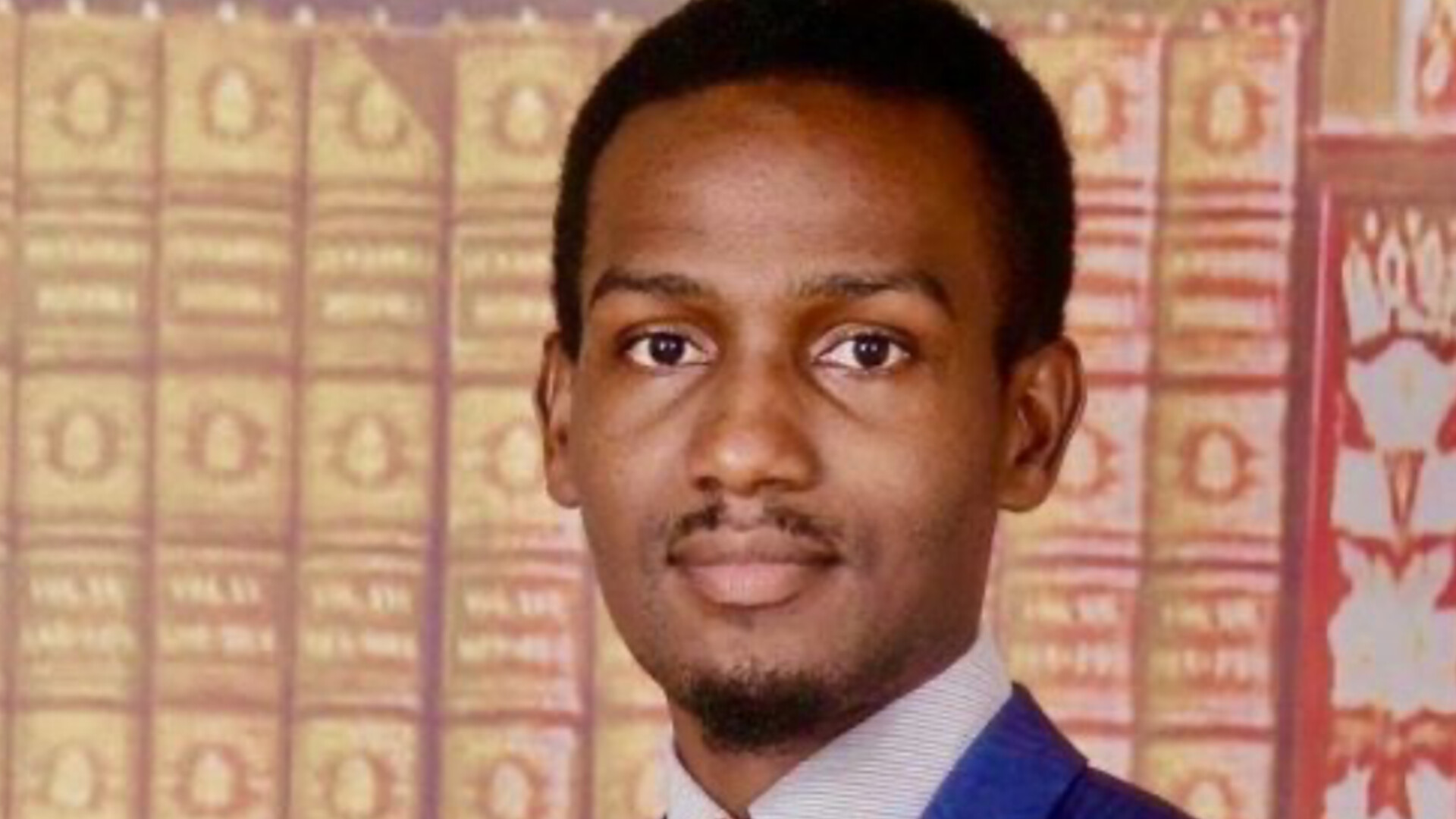Jennifer Elohor, a 28-year-old corps member from Delta State serving in Oba, Idemili South Local Government Area of Anambra State, was brutally assaulted, stripped naked, and taken away for questioning by operatives of the state-owned security outfit, Agunechemba, who stormed the corps members’ lodge over allegations of Internet fraud. Speaking for the first time since the attack, the traumatised Zoology graduate of Delta State University, Abraka, tells GODFREY GEORGE the events that led to the now-viral video, expressing her resolve to press charges in pursuit of justice
Videos of you being beaten by some gun-wielding vigilantes were recently circulated on social media. There have been different versions of events as to what led up to that, but no one has heard from you since the news broke. What happened on that day?
On July 23, 2025, around 5 p.m., some corps members and I were in the lodge handling our regular Place of Primary Assignment work. While some were marking scripts or charging their phones, others were just going about their usual activities when we heard a knock on the door.
I stood up to see who it was, since the people who knocked refused to state their names. Before I could get there, they had forced the door open. When I raised my head, I saw a masked man with a gun. He had no uniforms or any form of identification. Behind him, I saw about seven or eight others, also armed. The next thing I heard was, “All of you, come outside!” in a commanding tone.
At first, I thought they were robbers. But when they ordered us to come out, I was shocked. I confronted them, asking why they would barge into our lodge and force us out for no reason. I explained that we were corps members and had committed no crime.
As we argued, some other corps members came out and supported me. They brought out their ID cards and uniforms.
Did they state who they were and their mission?
No, they did not. As we were showing the men our ID cards, they pushed us aside, forced themselves into our apartments, and began ransacking the whole place. They unplugged our phones and laptops and accused us of being “Yahoo Yahoo” (Internet fraudsters).
We kept stressing that we were corps members. A few of us even showed them our uniforms, but they wouldn’t listen and forced us downstairs. It’s a three-storey building. We insisted they had to call our Local Government Inspector or the proprietor of the school we were posted to before arresting us, but the request only angered them more.
They were masked and armed. One even wore a female wig, probably as a disguise. How could we just follow masked men accusing us of fraud?
Did they eventually get through to the LGI or proprietor?
No! When we insisted on making a call, they threatened to smash our phones, shoot us, and dump our bodies in the bush. While this was happening, I kept wondering why they had targeted our apartment.
When we got downstairs, they insisted we follow them into their three vehicles. I kept insisting they call the LGI, and I think my voice was the loudest. One of them asked who I thought I was and then hit me first with a stick. The others joined in, slapping and beating me with sticks and guns. They tore my clothes and stripped me naked. Even when I tried to cover myself with the torn pieces, they dragged them off and continued torturing me.
What did the other corps members do when this was going on?
What could they do? The lady who tried to cry out was beaten badly with an iron and pushed to the ground. They warned that if the male corps members came close, they would be shot and dumped in the bush.
One of them asked what gave me the “liver” (courage) to confront them. They called me a prostitute and other names, and they kept beating me even as I was naked and helpless. Much of what they said was in Igbo. The Igbo-speaking corps members later told me what it meant.
Were you allowed to put on something before being taken to their station?
Oh no. I begged them to let me wear something, but they refused, saying I was stubborn and a prostitute and would follow them like that.
So, you mean they took you to their station stark naked?
Yes, I was completely naked. I used my hands to cover myself. I was bleeding, but they didn’t care. They dragged me into their vehicle naked. They also dragged the other corps members, nine of us in total, into their vehicles. In the van, they harassed me and pressed my neck.
One of them threatened again that if I made any sound, they’d shoot me and dump my body in the bush, and boasted that nothing would happen. At that moment, I believed him. Nobody knew me. If they had shot me and dumped my body, who would look for me?
Where were you taken to after the arrest?
We were driven through a bush path to an open field where we saw other young people sitting on the floor. They ordered us to sit down, too. All the while, I was still naked. A corps member gave me his shirt to wear, leaving himself bare-chested. Imagine me sitting under a tree in a completely open space like that.
What went through your mind as they drove you through the unfamiliar bush path?
I thought I was going to die. I felt the end had come. I thought they were kidnappers or ritualists. They could have taken alternative routes, but chose the bush path. If they had shot us and dumped our bodies somewhere, no one would know. They were masked and armed. It was as if they disguised themselves intentionally. I had already been stripped of my dignity and beaten. It was only when we got to the secretariat that I managed to see some of their faces.
What did these men say was your offence?
They accused us of Internet fraud. At their secretariat, I felt so unsafe. They looked scary and were heavily armed. They collected our devices, locked them up, and ordered us to remain seated on the floor.
The Anambra State Government has said the men who attacked you were only eight. Do you corroborate this?
They couldn’t have been only eight. They came in three Sienna vehicles. They were more than that.
When did help eventually come?
When the leader of the group came, he asked those who were there with their relatives to stand and move to a different group. It was as if they were separating us for slaughter. I was so scared because, even though I had a shirt on, I was still very much naked. And don’t forget, I was bleeding from my wounds.
After the separation, only nine of us corps members were left seated on the floor. He said we should look for a family member to come and bail us. We kept stressing that we had been telling them we were corps members, but they refused to listen.
They said it didn’t matter if we were corps members and insisted that we must confess if we had anything related to Internet fraud on our phones. We said no. They then asked if we were taking hard drugs. We said no again. They started threatening us again, but we maintained our stance. All this time, we were still seated on the floor.
How were you then freed from their custody?
At about 6:20 p.m., they allowed one of us to call our proprietor, who came and told them we were corps members. It was not until he arrived that we were released, after much ado. Even with our ID cards, these vigilantes refused to listen. We were all barefoot. They treated us like slaves. Even as they were about to release us, one of them insisted that we had to “settle” them before leaving.
At that point, they fired their guns into the air three times. My God! My heart sank. I thought they would shoot us because we had no money. One of the leaders was trying to identify me, but I managed to blend in with my colleagues and leave the place.
Did you involve the National Youth Service Corps authorities when you got back to your lodge?
Oh yes, we did. Immediately after we were released, we called our LGI, and he said he would come and see us the next day. At that time, I didn’t even know there was video evidence. I never knew that one of us, who was bathing when the raid happened, had made a video from afar before he was eventually arrested. He captured the moment I was beaten, wounded, and stripped naked. We eventually sent the video to the LGI, and he came that night at around 9:20 p.m.
When he got there and we explained everything to him, he said, “Okay. This is why I said you people should be walking in groups, in case of situations like this.”
I was shocked when he added, “What has happened has happened. Some of you ladies are going to get married to men who beat women. So, this is training for you.”
What is the name of the LGI in question that made such a remark?
His name is Mr Anayo.
What other steps did he take to address the matter?
He invited us to the LG the next day and said the men had been arrested. He asked us to calm down. I told him I wanted to see them behind bars so I would be sure my life was safe. He kept turning me around, and I never got to see any of them. I also stressed that I didn’t just want them arrested; I wanted the case taken to court so they would be punished for what they did. He told me to calm down, that he was handling the matter.
He then made some calls and spoke only in Igbo, so I couldn’t understand what he was saying. After some minutes, he said we could go to Awka to see the men who had been arrested. I requested that we all go with the other corps members who had been arrested, but he said no. After much ado, we managed to go.
When we got to their office, everything was said in Igbo. Nobody spoke English. So, I was cut off from the conversation. If they wanted to talk to me, they would switch to English, but once I replied, they would revert to Igbo.
Did you eventually see those men behind bars?
No, I never saw them in any cell. I was told they couldn’t take me there because kidnappers were being held. But after some time, they brought some men out and asked me to identify those who beat me. I could only identify a few. But I can tell you it was a staged arrest, because the very next day, I saw those same men in the area.
How did this make you feel?
I saw them walking on the street, and I looked at myself with all the injuries I had and breathed in heavily. It was so frustrating. I told my LGI about this new development, but he said he didn’t want to hear anything about it anymore. He told me he had already asked me to forget about it and that it was being handled. He even described the matter as “old issues.”
How many more months do you have to complete service?
I still have until October.
What then are you going to do, knowing that you would still have to go back to the same lodge where this incident happened to complete your National Service?
FOLLOW US ON:
FACEBOOK
TWITTER
PINTEREST
TIKTOK
YOUTUBE
LINKEDIN
TUMBLR
INSTAGRAM
































